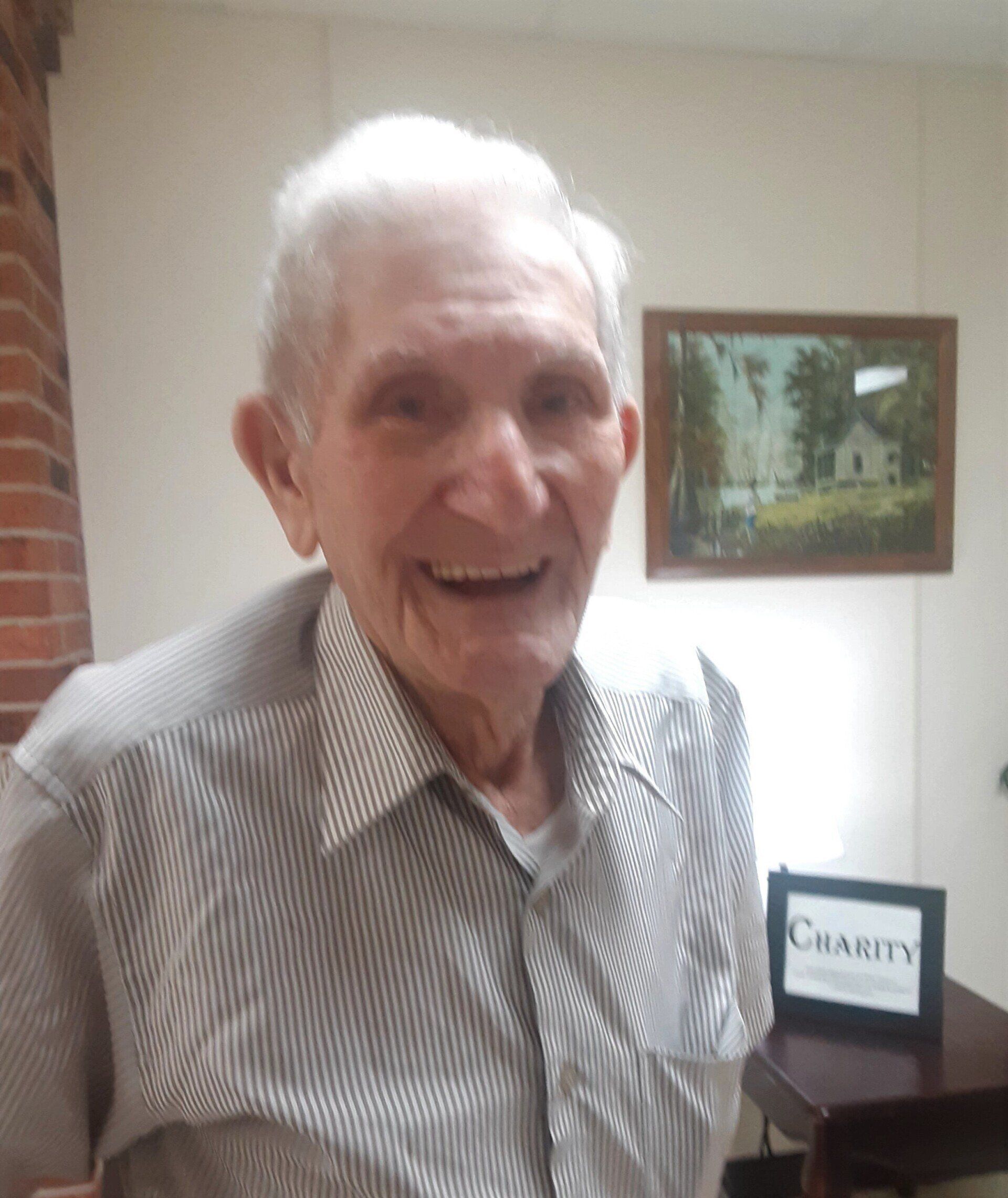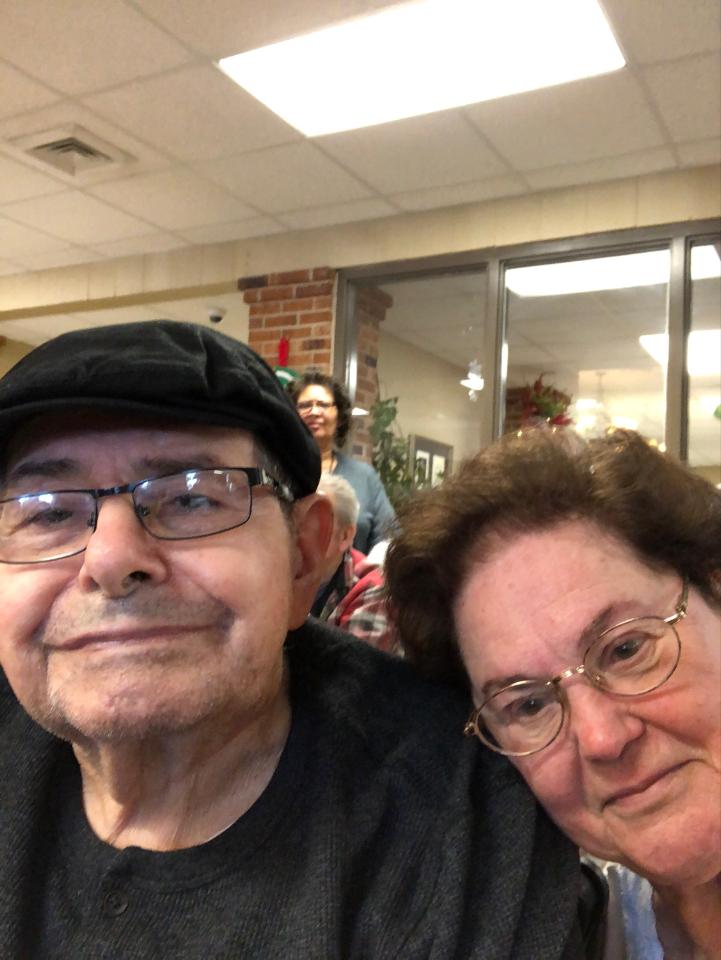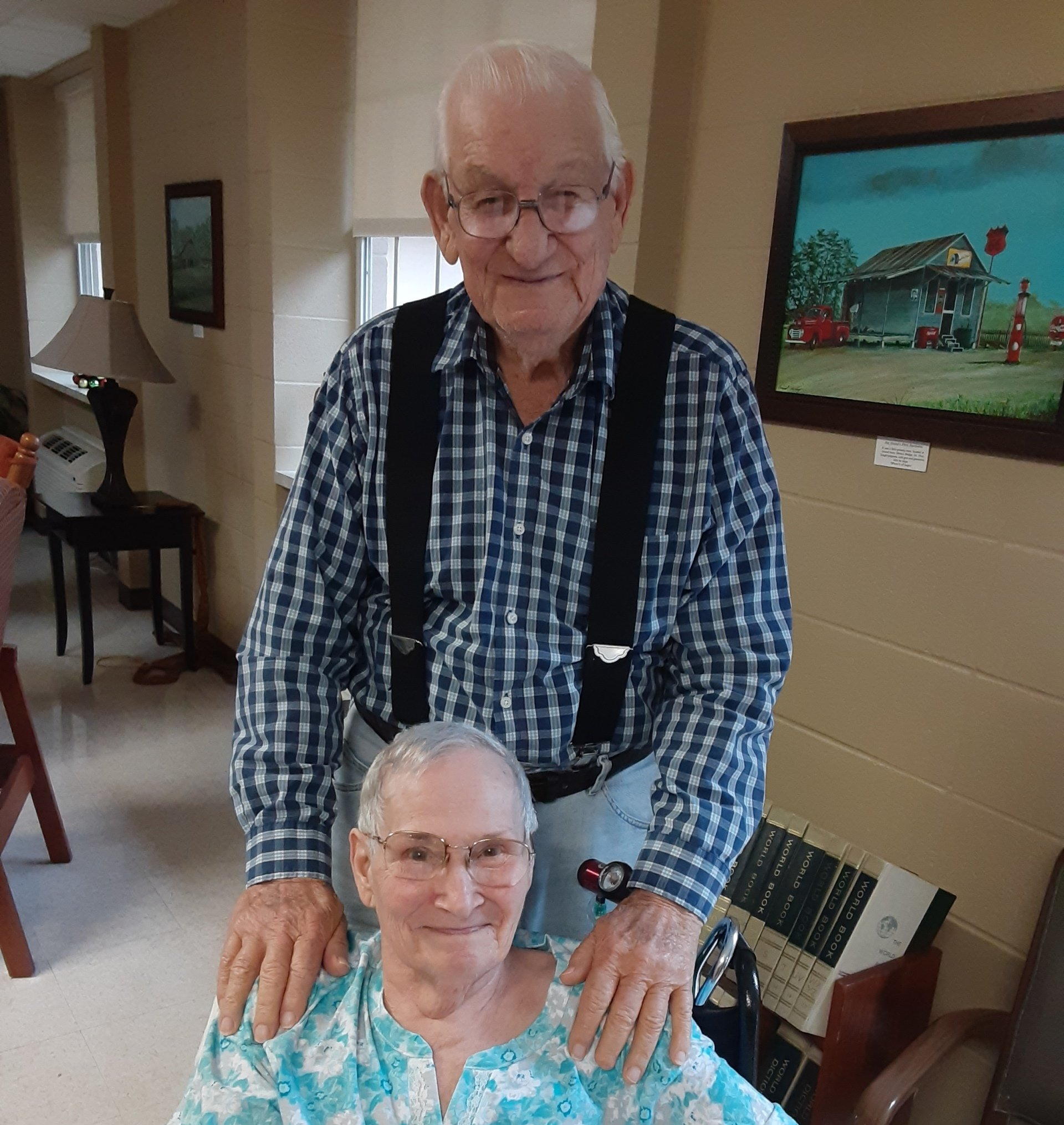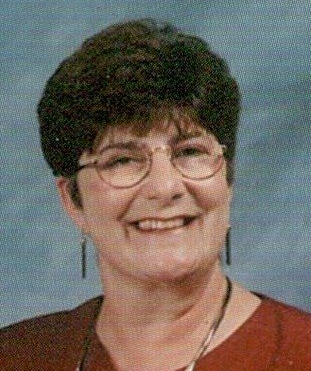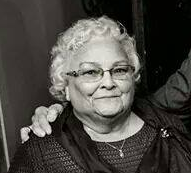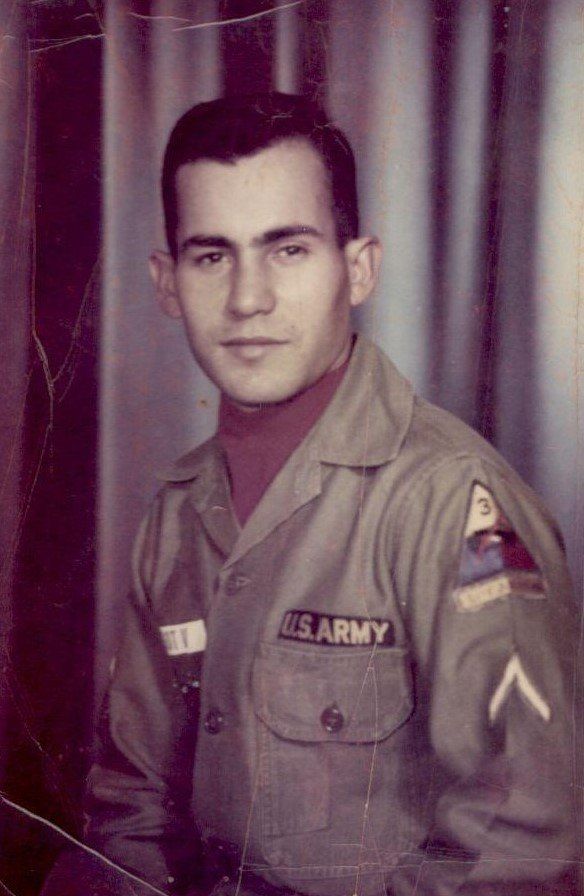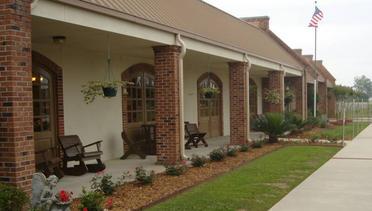Addis' Memoirs
Living to the age of 102 is incredible; but, not as incredible as a bedridden woman who is simply joyous. It is very difficult for her not to laugh at herself, her memories, her expressions, her naughty words… Addis laughs about lots of things. Smiling nurses and nursing home personnel seem to drop in often in Mathilde and Addis’ warm, welcoming room. Addis says she has been a resident for 3 years and she lived alone until that time. She says of her roommate at J. Michael Morrow Memorial Home: "Mathilde is an angel." Having known Ms. Mathilde Bourque all of my life, I agree. She is a very special lady, and, so is Addis.
In Addis’ family, there are 4 girls and 4 boys: “Rose, Eura, Addis, Howard, Louallen, Della, Foster and Stanley,” she rattles off quickly. I can hardly keep up! Her memory is much quicker than my writing ability.
The French-speaking family lived in Plaucheville in Avoyelles Parish near Bayou Choupique. She was born in 1913. Even with a large family, Addis attended public school and graduated from high school. Not only that, she is college educated. Addis tells me that she attended college in Natchitoches and became a school teacher. She wanted to major in Math but her boyfriend said he wanted them to major in a family and they did. He did not want his wife working. So, she volunteered instead. She was a teacher at the Catholic school which her 8 children attended. They helped other children attend the Catholic school. She adds that all of her children graduated from college.
Addis is no ordinary woman. She was married for over 60 years to Artus,
“Artie,” “the best man there ever was,” she explains. Artie came on the "Orphan Train." Near where Addis lived was a family who had 11 daughters and one son. When the priest announced at Mass that orphans could be ordered by Catholic families, the husband and wife discussed the matter and in the following week, they visited the priest at the rectory and ordered their orphan. A 2 ½ year old boy, Artus, who did not understand French, arrived in Mansura in about six weeks. Mansura was about 18 miles from Plaucheville. When his adoptive mother was asked how she communicated with the child, she simply patted her lap and said she held him on her lap and they understood each other just fine.
More information is available online regarding the Orphan Trains. From Addis’ description, it would seem that Artie came from Sister Mary Irene and the New York Foundling Hospital. Sister Irene’s group was the only one that requested the children be placed in Catholic families. This was accomplished through priests. The other groups gathered orphans and sent them to homes across the country via trains. Religion was not a factor in their placement of the children.
Artie was born in New York and was of German and Irish descent. Addis was 19 and he was 25 when they approached Addis’ father about getting married. Addis already knew that her mother did not approve because she felt that Addis did not know Artie well enough. But, Addis did know the man from her neighborhood who was always kind and always had something kind to say. Addis continues: “Everything about Artie was good and we loved each other.” When her father, the head of the household, was approached by Artie, he said “Yes.” A religious woman, Addis was married in the Catholic Church. The marriage produced 4 girls and 4 boys whose names are: Anthony, Lawrence, Marlene, Gail, Richard, Iris, Linda and her baby, “Jerry,” Gerald Artus.
At a time in her life, Artie’s adoptive mother lived with her youngest daughter, who seemed very cruel to Addis. Her mother-in-law came to visit one day and Addis knew something was bothering her. She would fidget and dig in her pocket and then finally, it came out. She wanted to come and live with Artie and Addis. Of course, they welcomed her into their home. This happened before Addis had children and so she was there to help with the children when they came and also nursing Addis when she suffered 5 miscarriages. She would have had 13 children, she says, if she had not lost the 5 in miscarriages. She even lost twins. In delivering the babies, Addis says it was much easier to give birth to the girls. Boys were harder to deliver.
The couple made a good living together. Addis worked hard. Artie was 6 years older and was prone to infections. “I drove back and forth to Alexandria for 27 years to bring Artie to Doctor Godley. In the end, the membrane around his lungs was destroyed. Any cold caused pneumonia. Me, I’m like a mule—A strong one,” she continues. They lived on a farm and Addis volunteered as a teacher at school.
On the farm, they had cattle. She knew how to back up the truck to load the
7 tubs of corn and the hay necessary to feed the animals. The hay was placed around the fence line. The cattle began eating. Addis pauses and then states: “Animals go for sweets, just like people. Artie would put molasses in pockets around the area and the cattle would lick on that first instead of eating the hay or corn. Even before I was married, I worked on a farm. I helped my poppa. I was the only one of the girls who learned to milk the cows. One thing I did not like to do was trim the mules’ tails. I did not mind the mane but I refused to trim the tails for fear I would get kicked. So, Poppa trimmed the tails and I did the manes.
“Artie and I had a Black Angus bull that was as big as an elephant. I was scared of it; but my husband was allergic to hay, dirt and corn dust. So, I would have to go in the pen with that bull. Russell, our neighbor, came and we visited on our porch. He told me that he saw me helping Artie with the animals. Artie explained to him that I worked on the farm because I wanted to. It was natural to me because I was raised that way. Russell said that if he left his horse at the porch, his wife, Enola, would not notice it. The horse could die at the porch but she would not occur to her to come out and see about it.
“My childhood home was fun. Plaucheville School was good. There was no TV or radio. We played games like hopscotch, marbles, crack the whip, which could whip your neck around if you were the tail. We played ball and barrel squat where we would squat down to let a friend climb up on our backs. We had a big yard and we would fall and roll in the grass. Girls and boys played together and spent many amusing days.
“Momma cooked and my favorite thing was hot chocolate with biscuits or Couche-Couche.” At Christmas, we exchanged gifts and prepared special dishes. My favorites were roasted pig, oyster dressing, sweet potato crunch and pecan pie. We always had pecan trees on the farm.
“For the oyster dressing, we used half pork and half chicken for the dressing mix. We cooked the mix with all the seasonings and made cornbread and crumbled it. Then, we stirred in the cooked dressing mix and added a quart of oysters and ground pecans. Next, we covered it air tight and left it moist.
“We also made sweet potato crunch. You bake the sweet potatoes, peel and mash them then add brown sugar and pure butter. Take care to remove all the wood from the pecans. They have to be clean. Grind the pecans and put that on the top of the sweet potatoes. Bake it and it is good!
“I have a good appetite. I eat like a mule! (Lots of Laughter!)
“At one time in my life, Father Louis Voorhies was my pastor. He loved Couche-Couche. I made it for him with a spoonful of sugar which would make a golden brown crust. He would say to me that he liked the ‘gratin’ brown and not black. Father would come with his dish and I would fill the dish with Couche-Couche and off he would go to his home to eat it.
“Father Voorhies died a horrible death. He did not stop for a stop sign. A big garbage truck hit him and then he struck a tree. This caused a broken neck. We went to see him and to bring him milk and Couche-Couche. At first, he did not recognize him; but, I reminded him of my cooking and that brought back memories.
“My recipe for Couche-Couche is cornmeal with a little salt and a big spoonful of sugar. I add water until the cornmeal is moist. I use iron pots a lot. I like the Dutch oven with a tail. That’s what I cook in. My food does not stick as much as a Magnalite pot. I have a set of those too; but, I like my iron pots. To make the Couche-Couche, I put oil in the bottom of the pot and place the pot on the burner and heat it until it is warm. I know when it is ready. I lower the heat and put the cornmeal mixture in the iron pot and I cover it. I cook the Couche-Couche slow. I let it make a crust, a dark crust. Jerry, my baby, told me once that he did not know I had pig blood; but, he said I liked cornmeal so much, I must have pig blood. I teased him that I should have named him ‘Chocolate.’ He loved chocolate cake, chocolate milk and even made sandwiches with chocolate and bread.
“I was the only girl in my family who learned to sew. I made wedding gowns and bridesmaids dresses for my daughters. That was a lot of work. Artie told me one day that we would go to the Singer shop and pick up a machine. I chose a Touch and Sew and that made the job much easier. I
still have that Singer Touch and Sew.
“My last car was a Cadillac and I still have it, too. It is white and has a navy leather interior. My Artie died in 1984. Before that time, our son Richard lived in San Antonio, Texas. Artie and I wanted to visit him. Richard sent instructions on how to get there. I followed where to pass. When we got there, Richard said: ‘You are Here’? I answered, ‘Well, yes! You sent the directions.’”
Addis continues about her family. Her son Richard never married. He lives in the Baton Rouge area. He has been in a school environment all of his life. Addis laughs: “He wanted to be sure that he was never a farmer.” He was a school teacher and a coach. He is a registered psychologist and was a teacher at LSU in the Psychology Department. Since Addis has been a resident at J. Michael Morrow Nursing Home, he has never missed a
weekend. Richard and Brother Brian originally from Grand Rapids, Michigan, visit Addis. Brother Brian and Addis taught at St. Joseph Catholic School in Plaucheville. This is the school her children attended.
Anthony, Addis’ oldest son was killed in a car accident on his way to work before he was 40. Anthony and Lawrence decided to work for the railroad in order to make “fast” money. They wanted cars and the railroad was a good company to work for. Anthony left a wife and six children.
Lawrence has three beautiful children and grandchildren. When he talks, they listen. He is a hard-working man.
As in every family, Addis has seen hardship and some of her children have gone through divorces and even chemical abuse. She does not cast blame in a failed marriage; but, she takes it all in stride. “Everyone has faults,” she says. When Artie criticized on of the in-laws, Addis was quick to correct him. “Everyone has faults,” she repeats.
Her daughter Gail was a busy lady and smart. She married and divorced and has died of “chemical poison.”
Iris married Stephen from Cottonport.
Linda is married to Gerald from Moncla, a small unincorporated community also in Avoyelles Parish.
Jerry has had health issues but is almost healed. He had two sons and a daughter.
Addis is concerned about the younger generation of this period. She feel they have too much time on their hands and that they lack respect for their elders. They seem to do whatever they please. She feels it is harder to raise children now. As a mother, she did whip and punish her children, when necessary. The children would lose their allowance and they lost their driving privileges. “Cher, ma yea, those little girls will take the upper hand.
Then, the boys feel they have to defend themselves and the arguing would start. Artie would tease that the girls learned to pick from me.”
Addis confesses that in college she picked up bad words. “The bad words are part of life,” she continues. In her Poppa’s house, there was no cussing! “You would quickly get a slap to the face if you cussed in front of Poppa. My husband, too, did not like cussing. He did not want me to teach our children cuss words.
Penance is part of my life. I will not eat meat on Wednesdays and Fridays. I challenged one of my sons to give up his beer. I think he eats meat on Fridays, too, now.
“I will tell you family names from my area, she says: Taylor, Lemoine, Campbell, Lacour, Guilbeau, Defoe, Gremillion, Couvillon, Bordelon, Saucier, Chenevert.” I have to write quickly.
Addis lost her beloved Artie. She says: “Losing a child is very hard; but to me, losing my spouse was the hardest thing I have endured. ‘Till death do us part,’ she adds. “Artie would have done anything for me.”
At the end of our visit, Addis tells me something in Spanish; but, I don’t understand. She speaks English, Cajun French, Parisian French and Spanish. Then, she sings a little song in French. It sounds like “Chuck a la anisette a la frotte palette… “
And, I wish I would have recorded that. It would seem there will be many opportunities because as I am leaving, I hear:
Saute crapaud ta cheue va brûler; Prende courage é va repousser
Next time.
Around Our Home Away From Home, Our Stories
